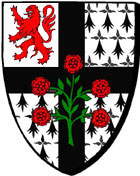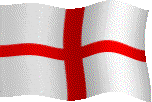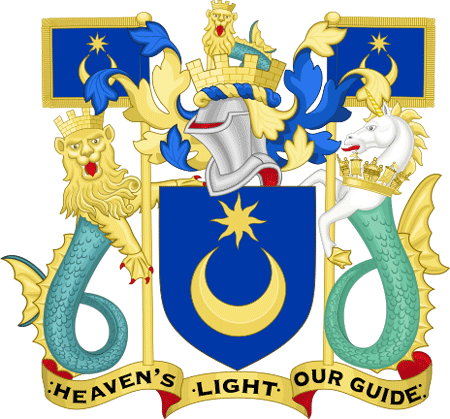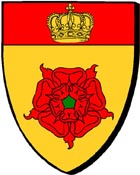
Encyclopédie Marikavel-Jean-Claude-EVEN/Encyclopaedia/Enciclopedia/Enzyklopädie/egkuklopaideia
 |
|||

England Bro-Saoz |

Portsmouth |

Hampshire *** |
|
Portchester Portus Ardaoni |
| pajenn bet digoret e 2002 | page ouverte en 2002 |
* forum du site Marikavel : Academia Celtica |
dernière mise à jour 14/07/2025 15:00:57 |
![]()
|
Définition / Displegadur : Ville portuaire d'Angleterre; comté de Hampshire. Fort britto-romain de la "Côte Saxonne". Aujourd'hui englobé dans Portsmouth. |
|
![]()
| Armoiries; blason / Ardamezioù; skoed : ce
sont celles de Portsmouth :
"d'azur à un croissant d'or, surmonté d'une étoile à huit rais aussi d'or" "en glazur e greskenn en aour, leinet gant ur steredenn a eizh derenn ivez en aour" |
|
![]()
|
i
Ordnance Survey : Map of Roman Britain |
![]()
|
Histoire / Istor : Le fort britto-romain de Portus Adurni fait partie du système de défense de la Côte saxonne sur la Manche.
*****
*****
*****
*****
***** Les Normands construiront par la suite un château fort de type médiéval à l'intérieur même du fort romain. |
![]()
|
Étymologie / Gerdarzh : A. Portus Adurni : * Rivet & Smith (1979 - 1982) : - Ravenna, 10619 : ARDAONEON; - ND XXVIII11 : PORTUM ADURNI; - ND XXVIII21 : Praepositus numeri exploratorum, Portum Adurni. "DERIVATION. There can be no certainty of the correct form of this name. ND's has long been known and has become established, but it has no special authority. The association of it with Ravenna's Ardaoneon, first suggested by Holder but seemingly not considered by British scholars, seems logical both textually and by position in Ravenna's list. However, the two texts are evidently citing the name in different or alternative forms : ND has Portus plus an apparent genitive Adurni ('port of...') or locative case ('port at... '), whereas Ravenna dispenses with 'port' and has a neuter nominative (-on representing -um, as always). For other instances of such different usage, see Abona, Dubris, Lemanis, all of which have Portus in sortie texts. Although in general ND is more trustworthy than Ravenna, the latter's number of letters must (despite probable miscopying of them) be taken into account. Although the other British names involving Portus involve what are ultimately river-names, this is not necessarily the case here, and Ravenna's -on (for -um) does not indicate a river. It is then likely that, as R&C proposed for Ardaoneon, British *ardu - ' height ' is involved, for which see ARDOTALIA, the reference being (if the identification, below, is right) to the hill behind the harbour. Ravenna's form then hints at a suffix, perhaps British *-on-io-, for which see CANONIUM, this appearing much compressed in ND's record. But ail this is very tentative. The modem river-name Adur (W. Sussex) is not relevant either for etymology or for location. It was probably coined by Drayton in 1612 on the basis of ND's entry; before that, the river was called the Bramber (see NOVIA)". IDENTIFICATION. If the reference to a heigh is correct, this must be the Roman fort at Portchester, Hampshire (SU 6204), below Portsdown, since the alternative sometimes suggested (Walton Castle, now under the sea off Felixstowe, Suffolk, TM 3235) can have had no such notable hill near it. There are no insciption recording the garrison in either case. ***** B. Portchester : * Eilert Ekwall : à propos de la racine *Port : "OE port 'harbour, town' (from Lat. portus) and port 'gate' (from Lat. porta) are found in pl. ns. Port 'harbour' is found e.g. in Portlock, Portsmouth (&c.), Portishead, Portland. Port 'town', esp. 'market town', is probably as a rule meaning in names such as Alport, Bridport, Newport, Westport. Cf. also Lamport. Port 'gate' is certain in Portgate". * A.D Mills (2003) : "Portceaster, c. 960; Portcestre, 1086 (DB). "Roman fort by the harbour called port". OE port + ceaster". |
![]()
|
Sources; bibliographie / Eien; levrlennadur : * Eilert EKWALL : The Concise Oxford Dictionary of English Place-names. Clarendon Press. Oxford. 1936 - 1980. * Lloyd and Jennifer LAING : Anglo-Saxon England. Paladin Book. Granada. 1979. * ALF RIVET & Colin SMITH : The Place-names of Roman Britain. Batsford Ltd. London. 1979 - 1982. * A.D Mills : Oxford Dictionary of British Place Names. Oxford University Press. 1991 - 2003 - envoi de ** |
![]()
|
Liens électroniques des sites Internet traitant de Portchester / Portus Ardaoni : * lien communal officiel de Portsmouth : Accueil - Conseil municipal de Portsmouth * Wikipédia français : Portchester — Wikipédia (comportant une confusion avec celui des Etats-Unis) * Autres pages Internet : http://www.localhistories.org/portchester.html * forum du site Marikavel : Academia Celtica * Autres pages de l'encyclopédie Marikavel.org pouvant être liées à la présente : http://marikavel.org/heraldique/bretagne-familles/accueil.htm http://marikavel.org/broceliande/broceliande.htm * solidarité nationale bretonne avec le département de Loire Atlantique : Loire-Atlantique * sauf indication contraire, l'ensemble des blasons figurant sur cette page ont été dessinés par J.C Even, sur bases de GenHerald 5. - Les armoiries de Portsmouth proviennent de Wikipedia. * Introduction musicale de cette page : Bro Goz Ma Zadoù, hymne national breton, au lien direct : http://limaillet.free.fr/MP3s/BroGoz.mp3 hast buan, ma mignonig, karantez vras am eus evidout go fast, my little friend, I love you very much |
![]()